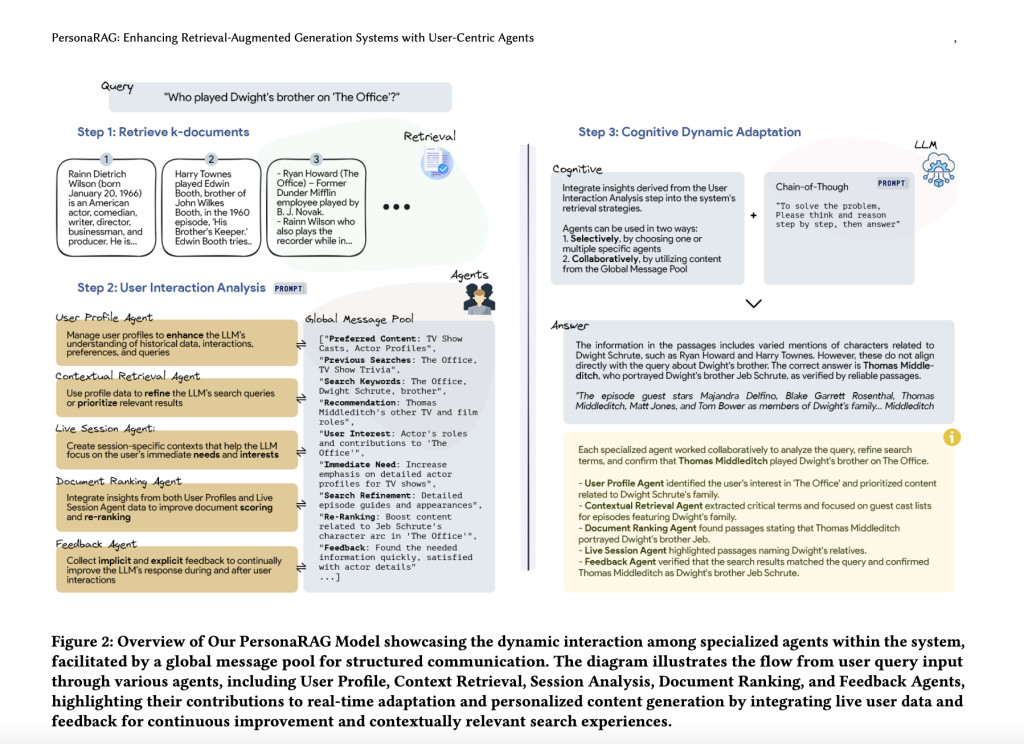In the rapidly evolving field of natural language processing (NLP), integrating external knowledge bases through Retrieval-Augmented Generation (RAG) systems represents a significant leap forward. These systems leverage dense retrievers to pull relevant information, which large language models (LLMs) then utilize to generate responses. However, while RAG systems have improved the performance of LLMs across various tasks, they still face critical limitations. One of the primary challenges is adapting outputs to the user’s specific profile and information needs. Traditional RAG systems often fail to incorporate user context or personalized information retrieval strategies, resulting in a gap between general effectiveness and customized user experiences. This paper from the University of Passau addresses this issue by introducing PersonaRAG, a novel AI approach designed to enhance the precision and relevance of LLM outputs through dynamic, user-centric interactions.
Existing RAG systems have made notable strides in improving NLP tasks such as question answering, dialogue understanding, and code generation. For instance, models like Chain-of-Thought (CoT) and Chain-of-Note (CoN) have refined the retrieval process by employing techniques such as natural language inference to select pertinent sentences. However, these advancements are often limited by their inability to adapt to individual user profiles and dynamically change retrieval strategies based on real-time user data.
PersonaRAG addresses these limitations by introducing user-centric agents into the RAG framework. This innovative approach promotes active engagement with retrieved content and utilizes dynamic, real-time user data to refine and personalize interactions continuously. By doing so, PersonaRAG enhances the accuracy and relevance of the generated responses, adapting them to user-specific needs while maintaining transparency in the personalization process. This methodology signifies a meaningful step forward in developing more intelligent and user-adapted information retrieval systems.
PersonaRAG integrates several key components to achieve its enhanced performance. At its core, the methodology incorporates user-centric agents that actively interact with the retrieved content. These agents utilize dynamic user data to refine the personalization process, ensuring that the responses generated by the LLMs are closely aligned with the user’s specific needs and preferences. The implementation of PersonaRAG involved extensive experimentation using GPT-3.5, with the model evaluated across various question-answering datasets such as WebQ, TriviaQA, and NQ.
The results of these experiments are compelling. PersonaRAG consistently outperformed baseline models, achieving an improvement of over 5% in accuracy. For example, on the WebQ dataset, PersonaRAG achieved accuracy scores of 63.46% and 67.50% using Top-3 and Top-5 passages, respectively, surpassing the vanillaRAG model by 25% and 17.36%. Similar performance was observed on other datasets, with PersonaRAG demonstrating the ability to adapt responses based on user profiles and information needs. This adaptability is particularly evident in its consistent performance, regardless of the number of passages retrieved, indicating the efficiency of its user-centric agents in extracting relevant information.
The introduction of PersonaRAG represents a significant advancement in the field of retrieval-augmented generation systems. By incorporating user-centric agents and leveraging dynamic, real-time user data, PersonaRAG addresses the critical limitations of traditional RAG systems. The enhanced personalization and relevance of responses improve the accuracy of LLM outputs and ensure a more user-adapted experience. This paper demonstrates that PersonaRAG’s innovative approach contributes to the progress of RAG systems and provides notable advantages for various LLM applications, marking a meaningful step forward in developing more intelligent and personalized information retrieval systems.
PersonaRAG effectively bridges the gap between general RAG system performance and personalized user experiences. Its dynamic adaptation to user-specific needs and robust performance across various datasets highlight its potential as a powerful tool in the realm of natural language processing and information retrieval.
Check out the Paper. All credit for this research goes to the researchers of this project. Also, don’t forget to follow us on Twitter and join our Telegram Channel and LinkedIn Group. If you like our work, you will love our newsletter..
Don’t Forget to join our 47k+ ML SubReddit
Find Upcoming AI Webinars here
The post Is the Future of Agentic AI Personal? Meet PersonaRAG: A New AI Method that Extends Traditional RAG Frameworks by Incorporating User-Centric Agents into the Retrieval Process appeared first on MarkTechPost.
Source: Read MoreÂ



